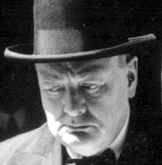| [images
added by this website] 
Thursday, September 23, 2004
UK
archives reveal Palestine plan By Rick Fountain
BBC,
London  SECRET
wartime discussions about Palestine
between Winston Churchill and the
future Israeli President Chaim
Weizmann (right) led to an icy
exchange with Anthony Eden, the
British foreign secretary, according to
official papers just released in London. SECRET
wartime discussions about Palestine
between Winston Churchill and the
future Israeli President Chaim
Weizmann (right) led to an icy
exchange with Anthony Eden, the
British foreign secretary, according to
official papers just released in London.
A top-secret Colonial Office file from
1943 shows that Mr Churchill favoured a
plan to try to bribe King Abdul Aziz
Ibn Saud, with £20m and the
leadership of a new Arab confederation, in
exchange for the Saudi monarch's help in
handing over Palestine to the Jews. As Mr Eden pointed out to his boss,
such a move would be the opposite of
British official policy. The idea was put to Mr Churchill by Dr
Weizmann, at that time head of the Jewish
Agency, the body which acted for the
Jewish community in Palestine in the years
of the League of Nations mandate. Mr Churchill was sympathetic to the
Jewish cause and had long been a supporter
of the 1917 Balfour Declaration which
proposed a national home for the Jews. But the usually emollient and
diplomatic Mr Eden was angered when he
heard from Washington that Dr Weizmann,
talking to one of President Roosevelt's
foreign policy advisers, Sumner
Welles, had referred to the project as
"the PM's plan".  Mr
Eden (right) wrote glacially to Mr
Churchill: Mr
Eden (right) wrote glacially to Mr
Churchill:
"I do not know how far Dr
Weizmann has authority to speak in your
name but I am a little worried about
the danger of confusion arising in
Washington."Our present Palestine policy has
been accepted by Parliament. "I know well your personal feeling
on this but there has been no
discussion suggesting that the US
government should be approached as
regards the possibility of modifying
it. "I must also record my view that Ibn
Saud would not be willing to receive Dr
Weizmann to discuss the future of
Palestine nor would he agree to
recommend to the Arab world any scheme
remotely resembling present Zionist
aspirations." Mr Eden pointed out that the 1939
London White Paper on Palestine was
unequivocally against letting it become a
Jewish state. In his reply, a day or so later, Mr
Churchill wrote: "Dr Weizmann has no authority
to speak in my name. At the same time,
I expressed these views to him when we
met some time ago and you have often
heard them from me yourself."  Mr
Churchill acknowledged however that even
if the King, then aged 67, was persuaded,
he might not live long enough to carry it
through. Mr
Churchill acknowledged however that even
if the King, then aged 67, was persuaded,
he might not live long enough to carry it
through.
"The great difficulty is the age of Ibn
Saud," he wrote. Perhaps aiming to soothe his foreign
secretary's anger, Mr Churchill added: "I
regard all discussion on these points as
premature at present and only liable to
cause dissension." © BBC
MMIV   Chaim
Weizmann's meetings with Churchill, Dec
1944 | Churchill's
meeting with King Farouk, King Ibn Saud
and President Kuwatli of Syria on Feb
17, 1945
Chaim
Weizmann's meetings with Churchill, Dec
1944 | Churchill's
meeting with King Farouk, King Ibn Saud
and President Kuwatli of Syria on Feb
17, 1945
|